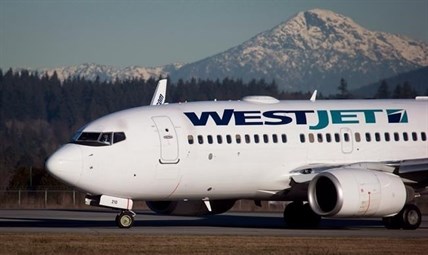
A pilot taxis a Westjet Boeing 737-700 plane to a gate after arriving at Vancouver International Airport in Richmond, B.C., on Monday February 3, 2014.
Image Credit: THE CANADIAN PRESS/Darryl Dyck
April 21, 2018 - 7:00 AM
MONTREAL - WestJet's new chief executive appears more open to negotiating with employees, but the hiring of outside pilots is hampering efforts to reach a deal, the head of the pilots' union said Friday after the labour group received $2 million from its international counterpart to help achieve its first collective agreement.
Ed Sims took over from outgoing CEO Gregg Saretsky in March in the midst of labour disputes with unionized pilots and the upcoming launch of a new ultra-low-cost carrier Swoop.
The Calgary-based airline and its pilots have been in contract negotiations since September. A 60-day conciliation process ends April 27. The pilots could launch a strike following a 21-day cooling off period.
"Ed Sims says he's committed to getting a deal done, which is great to hear, but I think we need to see some results," Capt. Rob McFadyen, chairman of the Air Line Pilots Association master executive council said Friday.
McFadyen said the last two negotiating sessions have failed to result in tentative agreements on any sections of the contract, while many significant issues remain outstanding.
Among them is the decision to hire outside pilots for Swoop, which is set to launch service in June.
"When you're outsourcing our work and our members see it and it's work they've done for a lot of years it makes it very difficult for us to come to an agreement," he said in an interview.
Sims said Friday he believes a resolution is possible and the company is working on a proposal to table in response to one submitted by the union.
He added that he has 18 years of negotiating experience with ALPA. His priority is to reach a settlement that is sustainable for the whole airline and one that is not detrimental to any employee group.
Sims joined WestJet in May 2017 after serving as CEO of Airways, New Zealand's air navigation service provider. He also held senior positions with Tui, Thomas Cook, Virgin Groups and Air New Zealand.
"I don't classify myself as anti-union," he said in an interview. "I am very, very pro-company and I think those are subtly different positions."
Sims said he prefers a direct relationship with the airline's 13,000 employees but acknowledges that every employee has the right to talk to other representatives.
Asked if the unionization of other employee groups including flight attendants is inevitable, Sims said the airline must ensure it treats them fairly and continue to grow to make their jobs more stimulating and exciting.
He wants WestJet to maintain a significant cost advantage with Air Canada but said he is open to conversations with those who believe a union might represent workers more effectively.
"I just fundamentally believe we get the unions we deserve," he said.
McFadyen said Sims is friendly and dealings with the new CEO have been somewhat more positive than they were with predecessor Saretsky, but progress has been very slow.
"What I have to look at is results and when I still see the same path being taken it makes me question whether this is being driven by CEOs or if it's coming from higher up in the organization," he said.
McFadyen said the coming week will be telling on whether enough progress can be made to have a deal before that deadline.
On Friday, WestJet pilots marked their first year since choosing to unionize by receiving $2 million from the international union's contingency fund to help with efforts to achieve a first collective agreement.
If the money is still required at next month's strike deadline, McFadyen said it will be used for a public campaign and other lawful preparations in Calgary, Vancouver, Toronto and elsewhere for a potential strike.
News from © The Canadian Press, 2018